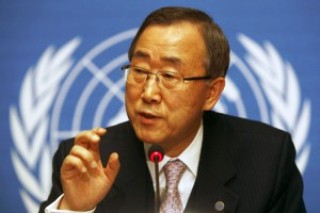UN chief denied calling on South Africa to deliver Bashir to ICC: official
July 14, 2015 (ADDIS ABABA) – The Sudanese government on Tuesday said that the United Nations chief, Ban Ki- moon, has denied that he asked the South African government to implement the arrest warrant issued by the International Criminal Court (ICC) against president, Omer Hassn al-Bashir.

Immediately after his arrival in Pretoria, the ICC urged South African government to arrest Bashir in line with the founding act of the court, Rome Statute, and threatened to report the matter to the tribal’s assembly of states and the UN Security Council.
However, he managed to leave Johannesburg despite of a decision issued by a judge from the South African High court ordering the government of Johannesburg not to allow him to leave the country.
At the time, the UN chief was quoted as saying that the ICC’s warrant for the arrest of Bashir must be implemented by countries who have signed up to the court’s statutes.
Sudan’s state foreign minister, Kamal al-Din Ismail, said Ki- moon denied during his meeting with Sudan’s first vice-president, Bakri Hassan Salih, in Addis Ababa Tuesday, that he made remarks about Bashir’s participation in the African Union summit in Johannesburg last month.
Ismail said that Ki-moon who met with Salih in the margins of the Third Financing for Development Conference in Addis Ababa denied altogether that he made any statement in this regard.
He said that Ki-moon told Salih that the ICC has nothing to do with the UN and that neither his office nor the UN general secretariat had issued any statements in this regard.
Bashir doesn’t recognize the ICC and sees it as a tool used by colonial powers against Sudan and the African nations.
THE CONFLICT IN SOUTH SUDAN
Meanwhile, Ismail said that the UN chief demanded Sudan to use its leverage to bring the ongoing conflict in South Sudan to an end.
According to Ismail, Ki-moon asked Salih for Sudan’s intervention to convince the various conflicting parties to come to the negotiating table to end the tragic war in the newborn state.
Ismail told the official news agency SUNA that Salih promised the UN chief to make his best efforts in this regard, pointing he is hopeful that peace and security would be achieved in South Sudan as soon as possible.
Fighting erupted on 15 December 2013 when internal debate over democratic political transformation and reforms within the leadership of the ruling party turned violent, plunging the country into national crisis and civil war.
According to Ismail, Salih and Ki-moon discussed several common issues including the status of the hybrid peacekeeping in Darfur (UNAMID), the security and humanitarian situation in South Sudan, the ICC and the mutual relations between Sudan and the UN agencies.
In a short statement released about the meeting, the UN chief said he discussed the situation in the Sudan’s Two Areas where the government troops fight the Sudan People’s Liberation Movement – North since four years.
“The Secretary-General said he remained very concerned by the humanitarian situation in South Kordofan and Blue Nile States,” said a statement released by the office of Ban’s spokesperson.
“He added that a transparent and inclusive political process is the only solution for Sudan to address the violent conflicts on its territory,” further said the statement .
The meeting was also attended by Sudan’s finance minister, Badr al-Din Mahmoud, and Sudan’s ambassador to Addis Ababa.
Ismail said that Salih has extended an official invitation to the UN chief to visit Sudan, adding the latter accepted the invitation and would set its date at a later time.
He pointed that Salih said the purpose of the visit is to follow up on the development of the situation in the Sudan.
The minister further added that Salih stressed Sudan’s desire to fully cooperate with the UN secretary general in the various issues, saying he expects the UN to play its role towards Sudan as a member country.
UNAMID
The UN secretary-general said in his statement he called on the Government’s support to the United Nations–African Union Mission in Darfur (UNAMID).
While the Sudanese state minister pointed that Salih underscored the need to develop exit programs for the UNAMID according to developments of the security situation in the region.
A tripartite team including Sudanese government, African Union and United Nations has been working since last March on UNAMID’s eventual exit from Darfur region.
Ismail noted that the UN chief informed Salih that he would instruct the UN representatives in the team to coordinate with the AU officials and the Sudanese officials to set a specific timetable for the exit of the mission.
The UN Security Council last month urged the resumption of talks on the UNAMID exit strategy but set several conditions for its effective withdrawal.
The mission has been deployed in Darfur since 2007 with a mandate to stem violence against civilians in the restive region.
It is the world’s second largest international peacekeeping force with an annual budget of $1.35 billion and almost 20,000 troops.
The minister further pointed that the meeting discussed the need for the international community to meet the pledges it made following the signing of the 2005 Comprehensive Peace Agreement (CPA) to cancel Sudan’s foreign debts.
Sudan’s external debt is estimated to be around $46 billion. Khartoum says it has completed technical and economic requirements for debt cancellation but observers assert that it is difficult for Sudan to secure it without Western backing.
The debit relief requires the unanimous consent of all 55 countries in the Paris Club, a matter that they see as improbable.
(ST)
